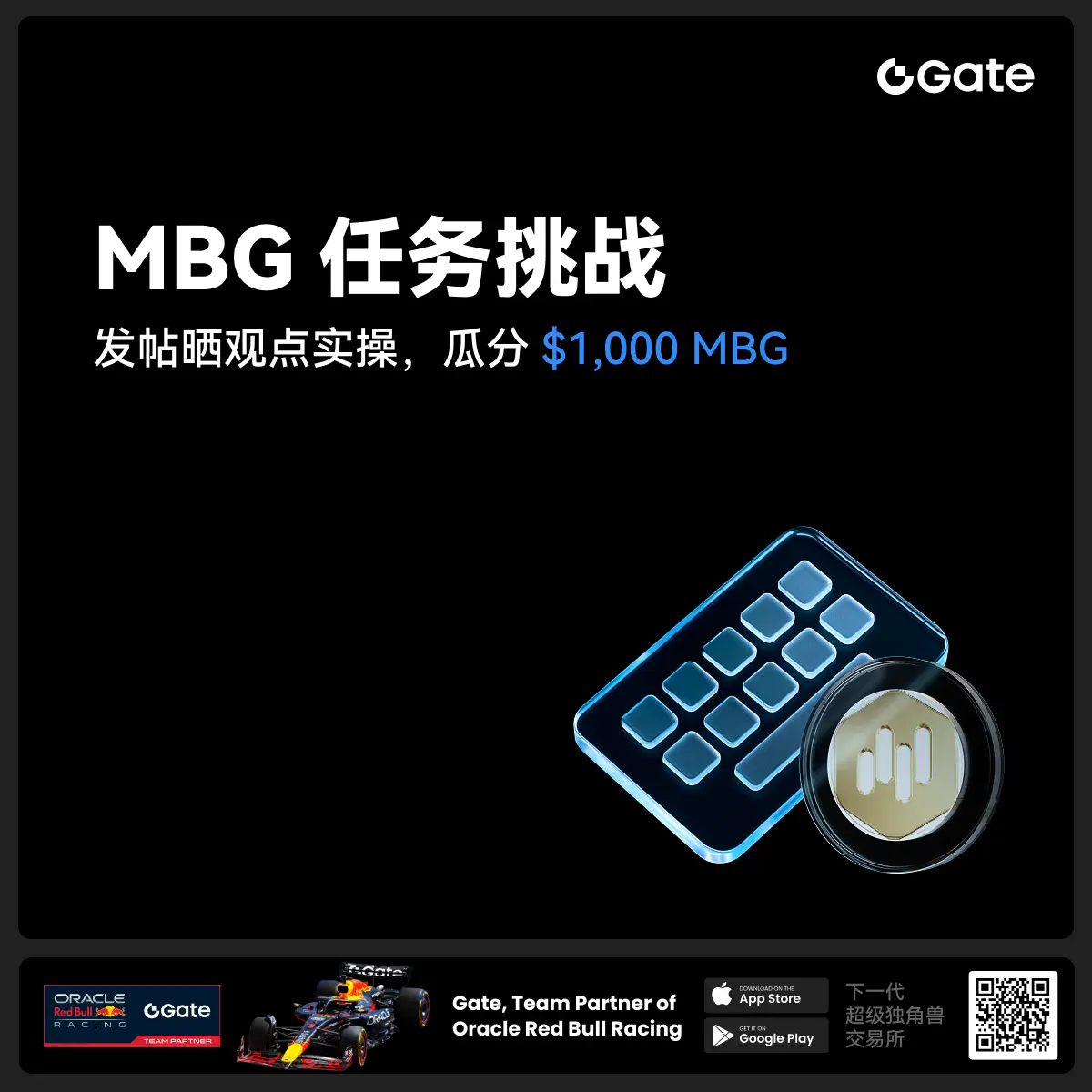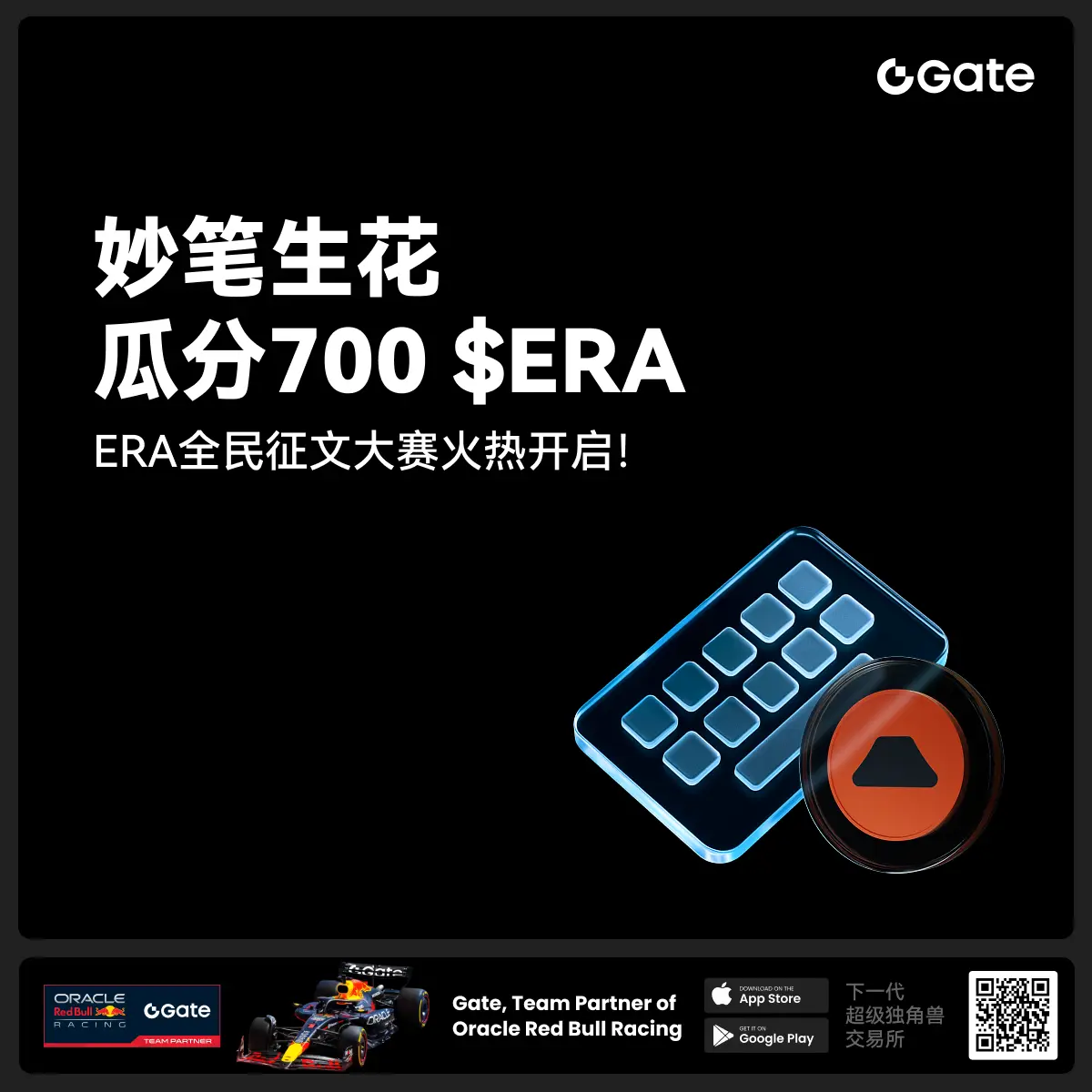- 話題1/3
7088 熱度
17461 熱度
11887 熱度
48058 熱度
20825 熱度
- 置頂
- 📢 Gate廣場 #MBG任务挑战# 發帖贏大獎活動火熱開啓!
想要瓜分1,000枚MBG?現在就來參與,展示你的洞察與實操,成爲MBG推廣達人!
💰️ 本期將評選出20位優質發帖用戶,每人可輕鬆獲得50枚MBG!
如何參與:
1️⃣ 調研MBG項目
對MBG的基本面、社區治理、發展目標、代幣經濟模型等方面進行研究,分享你對項目的深度研究。
2️⃣ 參與並分享真實體驗
參與MBG相關活動(包括CandyDrop、Launchpool或現貨交易),並曬出你的參與截圖、收益圖或實用教程。可以是收益展示、簡明易懂的新手攻略、小竅門,也可以是現貨行情點位分析,內容詳實優先。
3️⃣ 鼓勵帶新互動
如果你的帖子吸引到他人參與活動,或者有好友評論“已參與/已交易”,將大幅提升你的獲獎概率!
MBG熱門活動(帖文需附下列活動連結):
Gate第287期Launchpool:MBG — 質押ETH、MBG即可免費瓜分112,500 MBG,每小時領取獎勵!參與攻略見公告:https://www.gate.com/announcements/article/46230
Gate CandyDrop第55期:CandyDrop x MBG — 通過首次交易、交易MBG、邀請好友註冊交易即可分187,500 MBG!參與攻略見公告:https://www.gate.com/announcements
- 🎉 Gate廣場“星火計劃”入駐KOL突破1000人!
💥 創作者生態迎來全面爆發期!
📈 上首頁、拿獎勵、贏影響力,你還在等什麼?
💰 現金激勵 ✔️
🚀 流量扶持 ✔️
👑 專屬認證 ✔️
從0到1000,我們只用了短短數周,Gate廣場正在成爲Web3內容風暴眼⚡
你發布的不只是內容,而是下一個“爆款機會”!
🌟 加入星火計劃,開啓你的爆發之路!
👉 https://www.gate.com/announcements/article/45695
#GateSquare # #星火计划# #内容创作者新纪元 # #KOL集结令#
- 📢 #Gate广场征文活动第三期# 正式啓動!
🎮 本期聚焦:Yooldo Games (ESPORTS)
✍️ 分享獨特見解 + 參與互動推廣,若同步參與 Gate 第 286 期 Launchpool、CandyDrop 或 Alpha 活動,即可獲得任意獎勵資格!
💡 內容創作 + 空投參與 = 雙重加分,大獎候選人就是你!
💰總獎池:4,464 枚 $ESPORTS
🏆 一等獎(1名):964 枚
🥈 二等獎(5名):每人 400 枚
🥉 三等獎(10名):每人 150 枚
🚀 參與方式:
在 Gate廣場發布不少於 300 字的原創文章
添加標籤: #Gate广场征文活动第三期#
每篇文章需 ≥3 個互動(點讚 / 評論 / 轉發)
發布參與 Launchpool / CandyDrop / Alpha 任一活動的截圖,作爲獲獎資格憑證
同步轉發至 X(推特)可增加獲獎概率,標籤:#GateSquare 👉 https://www.gate.com/questionnaire/6907
🎯 雙倍獎勵機會:參與第 286 期 Launchpool!
質押 BTC 或 ESPORTS,瓜分 803,571 枚 $ESPORTS,每小時發放
時間:7 月 21 日 20:00 – 7 月 25 日 20:00(UTC+8)
🧠 寫作方向建議:
Yooldo
- 🎉Gate 2025 上半年社區盛典:內容達人評選投票火熱進行中 🎉
🏆 誰將成爲前十位 #Gate广场# 內容達人?
投票現已開啓,選出你的心頭好
🎁贏取 iPhone 16 Pro Max、限量週邊等好禮!
📅投票截止:8 月 15 日 10:00(UTC+8)
立即投票: https://www.gate.com/activities/community-vote
活動詳情: https://www.gate.com/announcements/article/45974
- 📢 #Gate广场征文活动第二期# 正式啓動!
分享你對 $ERA 項目的獨特觀點,推廣ERA上線活動, 700 $ERA 等你來贏!
💰 獎勵:
一等獎(1名): 100枚 $ERA
二等獎(5名): 每人 60 枚 $ERA
三等獎(10名): 每人 30 枚 $ERA
👉 參與方式:
1.在 Gate廣場發布你對 ERA 項目的獨到見解貼文
2.在貼文中添加標籤: #Gate广场征文活动第二期# ,貼文字數不低於300字
3.將你的文章或觀點同步到X,加上標籤:Gate Square 和 ERA
4.徵文內容涵蓋但不限於以下創作方向:
ERA 項目亮點:作爲區塊鏈基礎設施公司,ERA 擁有哪些核心優勢?
ERA 代幣經濟模型:如何保障代幣的長期價值及生態可持續發展?
參與並推廣 Gate x Caldera (ERA) 生態周活動。點擊查看活動詳情:https://www.gate.com/announcements/article/46169。
歡迎圍繞上述主題,或從其他獨特視角提出您的見解與建議。
⚠️ 活動要求:
原創內容,至少 300 字, 重復或抄襲內容將被淘汰。
不得使用 #Gate广场征文活动第二期# 和 #ERA# 以外的任何標籤。
每篇文章必須獲得 至少3個互動,否則無法獲得獎勵
鼓勵圖文並茂、深度分析,觀點獨到。
⏰ 活動時間:2025年7月20日 17
國際清算銀行與紐約聯儲啓動 Project Pine 智能合約工具測試,探索代幣化貨幣政策應用
火星財經消息,據 Cointelegraph 報道,國際清算銀行(BIS)與紐約聯邦儲備銀行創新中心聯合開展研究,測試基於智能合約的代幣化貨幣政策工具包。這項名爲 Project Pine 的實驗旨在探索區塊鏈技術如何幫助央行在未來的代幣化金融系統中實現快速政策響應。 根據 BIS 於 5 月 15 日發布的報告,研究團隊開發了一套“通用可定制代幣化貨幣政策工具包”原型,並在假設場景中驗證其靈活性。結果顯示,央行能夠即時調整政策工具參數,例如抵押品標準和利率,並在 10 分鍾內完成流動性抵押品與非流動性抵押品的置換。 BIS 強調,若貨幣與證券代幣化被廣泛採用,智能合約將成爲執行貨幣政策的核心技術。該框架允許央行“即時”部署新設施,例如調整儲備金利率或提供流動性支持,從而在抵押品價值下跌等危機中快速應對。報告稱,這種速度與靈活性爲央行應對“突發事件和快速演變的風險”提供了新思路。 不過,報告也指出當前金融基礎設施的局限性。多數傳統系統尚未兼容智能合約等高級用例,央行在推進技術整合時可能面臨挑戰。Project Pine 的測試採用以太坊 ERC-20 代幣標準,並結合另一套“訪問控制”標準以確保合規。 近年來,金融機構加速布局代幣化技術。在 Consensus 2025 會議上,美國存管信托與清算公司(DTCC)數字資產產品總監 Joseph Spiro 曾表示,穩定幣是貸款或衍生品等交易中實時抵押管理的“理想”工具。此次 BIS 與央行的合作,進一步印證了傳統金融領域對區塊鏈技術的探索趨勢。